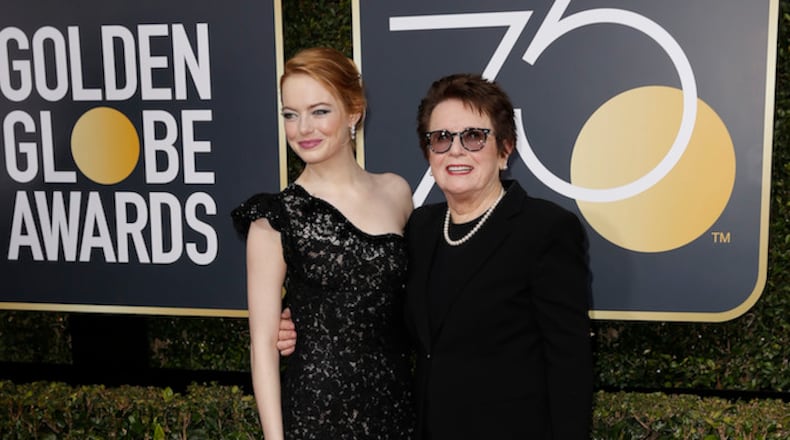At Wimbledon in 1968, Rod Laver and Billie Jean King became the first champions of the strawberries-and-cream crowd in tennis' open era. When it came time to cash a paycheck, though, the shared experience ended.
Laver was paid roughly $2,600, while King walked away with $970. The loud and uncomfortably clear message it delivered: There was a difference in those championship achievements, right down to the monetary value.
That's why the decision of the United States Tennis Association to name the Girls 18s and 16s National Championships at Barnes Tennis Center after King makes a powerful statement.
The 74-year-old megaphone for change challenged a country and a sport to rethink gender equity, to reconsider equal pay, to open minds to sexual orientation and so much more.
In a world too prone to berate than listen, stubbornly picking sides over substance, the name on the tournament unfolding this week and the voice behind it feels as important now as 1973 — the year King toppled Bobby Riggs in the Battle of the Sexes.
"When you're an athlete, they'll tell you to be quiet, just go out and play," King said by telephone Tuesday. "I get a little irritated when (athletes) have a chance to speak up and they don't. Not everyone is willing to, or able to. They're thinking about the bottom line.
"But I think it's important to speak out, particularly for girls, knowing that they have a voice. They're not taught that as a girl."
Those "character revealing" windows, as King coins them, have the ability to shape something more meaningful and lasting than volleys and drop shots.
Two former players in the tournament now named after King faced off in the 2017 U.S. Open women's final. Sloane Stephens topped Madison Keys to earn a very un-1960s check of $3.7 million. No single person played a larger, roll-up-your-sleeves role in creating that opportunity than King.
Why does it matter? Ask Haley Giavara, a 17-year-old who attended Serra High School in San Mateo and is one of the top junior players in the world.
"It just gives me the inspiration to stand up for things I believe in, as well," Giavara said of King's impact. "To go into society and feel like I have the confidence to express how I feel, she gives us all the courage to do that."
King paused as she considered Giavara's thoughts about her life's path.
"It's very kind and very touching," she said. "What I love about it, every generation has to fight for equality and freedom. They're the ones who can change it. My generation's job is to support them. They are now the future leaders. Everyone's an influencer.
"Obviously, she understands her power and knows she has a voice."
King was named one of the "100 Most Important Americans of the 20th Century" by Life magazine, among a small subset of athletes that included Muhammad Ali, Jackie Robinson and Babe Ruth.
She recently tweeted support for NBA star LeBron James by writing, "Athlete activism can affect positive change and should be celebrated, not derided. ... May your actions inspire other athletes to do the same."
"I saw the dedication of the (I Promise School)," King said of the education project for financially challenged families in Akron, Ohio, supported by James and area taxpayers. "First of all, he's so powerful. He feels the responsibility, but he wants it as well. Just like as an athlete, he wants the ball.
"He's trying to make a difference off the court, just like I tried to do off the court in tennis. Sports are a very powerful platform."
King preached collaboration more than corrosive contention.
"The goal should be to figure out how to get people together and get on the same page," she said. "It's very important that we find ways to collaborate. It seems the world has gotten more and more into silos. We need to connect the silos.
"I think it's pretty easy to know the right thing to do, if you're a human being."
The fight for fairness required persistence.
"It's absolutely vital, what we did," King said of developing the modern-day women's tour. "We wanted men and women together, but they rejected it. So we went to Plan B, and sometimes Plan C and D and F."
The sense of traditional boundaries that limited athletes has evolved.
"They're finally including us, like they do in politics and music and acting and everything else," said King, who will travel to San Diego for weekend matches. "We've always been left on the outside through the years and we need to be on the inside.
"Hey, we're not dumb jocks. We actually have brains."
Now, the San Diego-based tournament that shapes champions is forever linked to a player who reshaped expectations.
What's in a name?
In this case, it's game, set and ceiling-shattering match.
About the Author
Keep Reading
The Latest
Featured


